All news
2009 AACR Roundtable Conference
Perspectives on Institutional and Individual Civic Responsibility During Crisis and Disaster The Looming Pandemic Threat
May 5, 2009 - Washington, D.C.
The Association of Americans for Civic Responsibility (AACR) held its sixth annual roundtable conference on May 5, 2009, at the Paul Greenberg House, Syracuse University, Washington, D.C. The half-day conference, "Perspectives on Institutional and Individual Civic Responsibility During
Crisis and Disaster - The Looming Pandemic Threat," featured three topic discussion sessions lead by expert panelists in the fields of psychological, health, and medical research, preparedness, and emergency response. The
conference was highlighted by a keynote luncheon session with Dr. Barbara Reynolds, Crisis Communication Specialist, Office of the Director, Centers for Disease Control and Prevention. The conference
was extremely timely, falling as the H1N1 (swine flu) outbreak occurred. The topic generated valuable discussion on the path of an epidemic and speculation on the future of our disease preparedness systems. The conference
was attended by representatives from over 40 local and national agencies, corporations, organizations, and academic institutions.
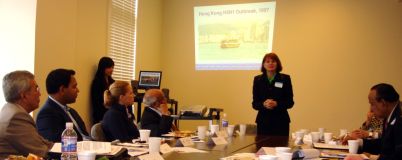
Mr. Chad Tragakis, Senior Vice President, Hill & Knowlton, Washington, D.C., began the conference by addressing the attendees. He spoke about the choice of AACR to highlight pandemics in their sixth
annual conference, and how, despite the lack of "front page news coverage" they received while in the initial conference planning stages, there was a need to discuss the sense of civic responsibility that all must take
in the event of a major outbreak. He noted the "pragmatic tone" of the day's discussion, ending on the value of the sessions to the future.
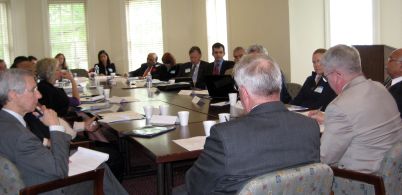
Panel I: "Society, Psychology and Civic Responsibility: Inside the Mind and Mindset of
Citizens, Samaritans and Survivors During a Pandemic Crisis"
Dr. George Everly, Associate Professor of Psychiatry at the Johns Hopkins School of Medicine opened the discussion with the idea of resiliency. "People are resilient," he stated, delving into the factors,
both past and present that make us resilient. "Resiliency," according to Everly, "is the ability to adapt or rebound from adversity." But even before we have resiliency, we must have resistance, which maintains infrastructure
and keeps society afloat during times of crisis. The higher our resistance and resiliency as a society, the less need for recovery following a crisis, which utilizes valuable time and resources.
Everly continued by discussing the factors that increase our personal resistance, such as experience, integrity, psychological self-regulation, and expectancy. One of the most important factors of this resistance, or "psychological
first aid," is a function of the leadership that society is given during a time of crisis. He stressed the need to "unravel the mystery of resilient leadership," which will effectively reduce human suffering and avert
catastrophe, through the development of bold and decisive leaders.
Dr. Dan Barnett, Assistant Professor, Johns Hopkins Bloomberg School of Public Health, followed Dr. Everly, with a discussion on the response willingness of local health departments during times of crisis. He began with
data covering the path of pandemics, citing that the average time between pandemics tends to be around 24 years, therefore it is not surprising that we find ourselves on the brink of one now. He continued, discussing
what leads to the willingness of a population and its leaders to respond to a crisis.
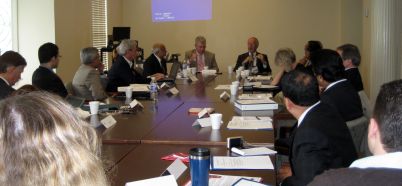
According to Barnett, people frame messages from the media and the government regarding a crisis to assess the best way to take care of oneself. People go through an "appraisal process," the first step assessing the threat,
its severity and proximity, and the next assessing the efficacy of their response and how helpful to themselves and others their assistance will be.
He concluded by discussing how to best use the knowledge gained on personal responses to pandemics to train and mold a response pattern. It is critical, according to Barnett, that it be noted that "ability and willingness
to respond are distinct and scenario-specific." With that knowledge, training must be focused on attitude, not merely skills and knowledge, to cultivate a culture of ability.
Panel II: "Response and Responsibility: Collaborating to Prevent or Contain
Pandemics"
Dr. Michael Schneider, Professor, The Maxwell School, Syracuse University, began the session addressing the attendees, framing the discussion by highlighting the need for issue concern and cooperation.
"We can't prevent and contain pandemics," he said, "but we can respond." "We wish we could prevent and contain, but it doesn't seem to be in the cards from the health policy and communication sense.But we can't not
respond." He highlighted the need to bridge the gap between the local, state, and federal response tactics in order to develop the best, most worthwhile response.
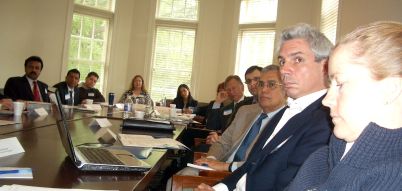
Dr. Pietro (Peter) Marghella, Senior Advisor for Pandemic Influenza Preparedness and Response to the Operations Coordination and Planning Directorate, Department of Homeland Security, began with a brief overview of the
deliberate and crisis action procedures by his Department, the Joint Operational Planning and Execution System. This system was created to streamline the planning and execution of response tactics, in order to prevent
disbarring responses.
He continued by discussing the problems with "silos" in the healthcare space. These organizations are vertically run and have trouble collaborating amongst each other. The same concept is found in government, especially
with the relationship between federal and local level authorities, which was best seen in Hurricane Katrina. This causes trouble with our response, and leads "towards failure."
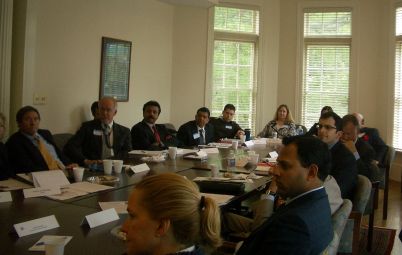
Marghella finished with a sense of hope, but an urgent need for change. "We need to have a common approach to planning," said Marghella, "and until we get there we are going to see Katrina repeated over and over again."
The government is taking steps to eliminate this, through new systems such as the Integrated Planning System, but they are going to have to work with local levels to reach collaborative efforts. He concluded with the
affecting statement, "We're all in this together."
Corey Gruber, Acting Deputy Administrator, National Preparedness Directorate (NPD), Federal Emergency Management Agency (FEMA), began by discussing his hope and belief in the transition system of FEMA,
and the response to the H1N1 virus so far. Continuing by discussing the response of Mayor Gulianni, and his and the city of New York's response to 9/11, he praised the anticipatory practices of the city. He stressed
the importance of leadership and the need for leaders to be actively involved in planning and response tactics, and how this can transform the mentality and response of a city. Response starts years before a crisis.
This is vital to the response efficacy. He concluded with the acknowledgement of the inefficacy of the government's current planning abilities, and the need for more time and research to be devoted to prevention and
preparedness.
Luncheon Session: "What is Different? Preparing for Pandemic Influenza"
Dr. Barbara Reynolds, Crisis Communication Specialist, Office of the Director, Centers for Disease Control and Prevention addressed the attendees in a special luncheon keynote address. She began with her
experience and path to pandemic prevention, reviewing the H5N1 Flu outbreak in Hong Kong in 1997, and her role in response and prevention. Highlighting the reports out of the CDC of widespread infection and death in
the next pandemic, Reynolds's spoke of her struggle to answer the questions of the media, who "were asking hard, but good questions," and made note that this was of course destined to happen again.
Reynolds continued, explaining the consequence and severity of the "W" shaped graph that was characteristic of the 1918 pandemic and the current H1N1 outbreak, where not only the very old and the very young are affected
by the disease, but also those in their prime, the healthy young adults. She stressed the need for a national strategy and the focus on community hardiness to counter the pandemic, tying back to the first panel and
the discussion of personal efficacy and response, highlighting the importance of personal resilience.
Reynolds concluded with the founding principles of the Crisis and Emergency Risk Communication (CERC). "Be
first, be right, be credible," Reynolds said, "express empathy, promote action, show respect. These are the founding principles." Following these principles is the key to disaster response.
Panel III: "90 Years Later: Lessons Learned - and Still Unlearned - From the 1918-1919
Spanish Influenza Pandemic"
Dr. Piyush Agrawal, Former President of the Association of Indians in America and Regional Vice President of the Global Organization of People of Indian Origin, moderated
the panel.
Dr. Amir A. Afkhami, Instructor of Psychiatry and Behavioral Sciences and of Global Health, George Washington University addressed the attendees on the future of the Swine Flu epidemic, and where the United
States must go from here. He traced back the path of the swine flu, to the first outbreak at Ft. Dix, New Jersey many years ago, and stressed that while this is more widespread than before, this is not a new epidemic.
Dr. David Morens, Senior Advisor to the Director, Office of the Director, National Institute of Allergy & Infectious Diseases, National Institutes of Health discussed the progression of the virus, and
how we now understand treatment options. However, while he acknowledged the benefit of the abundance of knowledge society and medicine has gained, he was quick to mention that there may be too much information available.
It is difficult to find credible sources, and once there is an abundance of information, there is confusion in planning, preparedness, and response, all critical steps that must be carried out in the most efficient
manner possible.
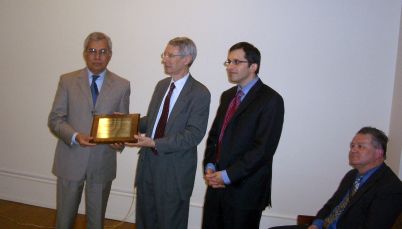
The successful sixth annual AACR conference came to a close with a brief awards presentation featuring prominent contributors to AACR. AACR's 2009 Outstanding Award recipients are: Dr. Piyush C. Agrawal, Chairman, APS Technologies,
Inc. Miami, Florida; Mr. Joseph Melookaran, CPA, President, JMA Chartered, Overland Park, Kansas; Mr. Francis J. Skrobiszewski, Washington, DC; and Dr. George Thomas, Founder, Bradenton Cardiology Center, Bradenton,
Florida.
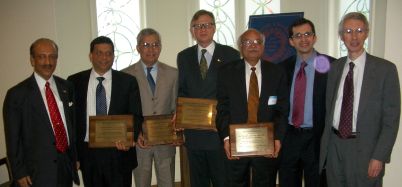
In his concluding remarks, Dr. Joy Cherian, President of AACR stated: "AACR is thankful to Dr. Michael Schneider, Director of the Washington International Relations Program, Maxwell School of Syracuse University and his
colleagues at this august institution for hosting this conference. AACR is also grateful to Mr. Chad Tragakis, chairman of the AACR Committee on Institutional Civic Responsibility and Senior Vice President, Hill and
Knowlton, for making this conference possible through the generous sponsorship of Hill & Knowlton. I want to salute student interns of Maxwell School, especially Ms. Minyan Yin, Ms. Katherine Avgerinos, and Ms.
Megan Humphreys for their initiatives and hard work beyond their call of duties. "
AACR is thankful to Ms. Megan Humphreys for helping to prepare this report.










